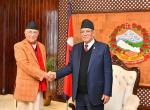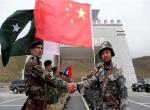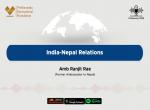Our conduct at the United Nations Human Rights Council (UNHRC) at Geneva on the US sponsored resolution against Sri Lanka on human rights violations of the tamilian population has raised questions about the coherence, maturity and objectivity of our policy towards our neighbour. Our Sri Lanka policy has to be based on wider considerations than politicking within the UPA government and exaggerated posturing for electoral reasons by the DMK on the ethnic issue.
The anguish in Tamilnadu about the Rajapakse government’s failure to make tangible political progress on the ethnic issue should be recognized. The Sri Lankan government has not been able to shed the mood of truimphalism after the decisive military victory over the LTTE; it has gone back on its promises on devolution; an honest probe into alleged large scale human rights violations during the last days of military operations remains pending; the recommendations of the Lessons Learnt and Reconciliation Commission have not been implemented.
However, to allow this anguish to govern our policy towards Sri Lanka, to the exclusion of other factors, would be a serious mistake, especially when demagoguery is resorted to by sections of political opinion in Tamilnadu and the tamilian diaspora abroad. There is loose talk of genocide despite the cessation of miltary operations four years ago. Why is that between 2009 and now this genocide of tamilians was not discovered? Why castigate the deplorable political failure of the Rajapakse government as genocide?
Foreign Policy
No doubt foreign policy cannot be altogether divorced from domestic opinion and regional sentiments therefore cannot be ignored in foreign policy making. Foreign policy, however, operates in a context quite different from domestic politics, the stakes are different, the involvement and interests of third parties is a complicating factor, and national security and geo-political factors come into play. Besides, the weightage to give to regional sentiments as distinguished from national sentiment has salience in decision-making.
If our foreign policy towards Sri Lanka should be based on the sentiments of the people of Tamilnadu today, then sentiments in West Bengal should dictate our foreign policy towards Bangladesh tomorrow, and those in UP and Bihar should determine what we do with Nepal day after. It would be a mistake to begin treating our relations with our neighbours as extensions of the pulls and pressures of our domestic politics. Our neighbours are independent, sovereign countries, which requires that we control our domestic lobbies and prevent them from distorting our policies in our periphery. Moreover, when the states are today resisting strongly encroachment on their powers in a federal system, they should also respect the prerogative of the centre to make foreign policy.
Unlike ours, US stakes in Sri Lanka are limited. They do not need to calculate the consequences of the initiative they take to censure Sri Lanka at the UNHRC with as much care as we have to. They promote the human rights dimension of their foreign policy as part of the larger objective to universalize their values, to retain the high moral ground in international affairs and avert attention from the human costs of their military operations abroad. They do not take into account the stress they put on our policy towards Sri Lanka by moving resolutions in the UNHRC against it, forcing us to adopt a position that we would like to leave undefined so as to retain sufficient space to deal with the complex situation there.
Apart from this gap in managing our strategic relationship with the US in our neighbourhood, it is galling that we have to support the targeting of Sri Lanka by bodies like Human Rights Watch and Amnesty International which gave us a miserable time in the 1990’s over allegations of human rights violations by our forces in J&K, boosting the Pakistani campaign against us on this issue.
Past
Even the US State Department was complicit in this. We opposed the objectivity and credibility of these human rights organisations when we were targeted; now we endorse their findings to put Sri Lanka on the mat.
Our policy of not supporting country specific human rights resolutions at Geneva was sound, as these resolutions are used by the West to erode the international legitimacy of regimes considered adversarial. We have been criticized for not taking a clear cut position on human rights issues as behoves a democracy and a rising power called upon to assume greater responsibility for upholding the international order. Apart from a disinclination to play by double standards, we have favoured dialogue over denunciation in dealing with human rights abuses in countries. We abandoned this policy last year in voting against Sri Lanka and did so again this year.
Resolution
This time too we began by softening the US resolution where it was too intrusive and undercut Sri Lankan sovereignty too blatantly. However, because of extreme DMK pressure on the government our diplomatic strategy fell into an embarrassing disarray. In a last ditch effort to placate the DMK we sought a toughening of the US resolution after our previous efforts to soften it. Worse, the US rebuffed India because it did not want the balance of the resolution disturbed for fear of losing numbers in support. We put ourselves in a situation where the US appeared moderate and we unprincipled and opportunistic.
We do not have to condone Sri Lanka’s failure on reconciliation and accountability issues. But we should deal bilaterally with Sri Lanka, and forcefully at that to contain the mounting backlash in Tamilnadu. As a regional power we should not outsource such responsibility to others, as this erodes our position and exposes our irresolution, adding to our neighbourly woes. If we don’t use our power we will be seen as powerless.
Published Date: 26th March 2013









Post new comment